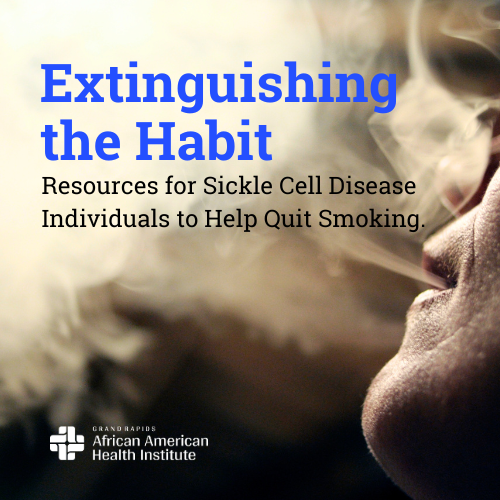Navigating the daunting complexities of living with Sickle Cell Disease is a formidable challenge. The task becomes even more daunting for those aiming to overcome their tobacco dependence. However, there is hope, as a plethora of resources are available to assist individuals on their journey to cessation. These resources focus on offering personalized support and tools that are easily accessible. Crucially, they aim not only to aid in quitting but also to empower SCD individuals to lead healthier lives, liberated from the grip of tobacco.
Fewer than one in ten adult cigarette smokers succeed in quitting annually, underscoring the substantial difficulty associated with cessation efforts. To bring this into perspective, around 30% to 50% of smokers in the US make attempts to quit annually. However, success rates are so minimal, with only 7.5% achieving the feat (Pierce, 2022). These figures may even be as low as 4 to 7% (American Cancer Society). The high prevalence of smoking is similarly reflected in populations with Sickle Cell Disease (SCD), where 36% of these individuals actively smoke. For them, the challenge of quitting smoking is particularly daunting, as many use smoking as a coping mechanism for pain (Cohen et al., 2010; Britto et al., 1998).
Taking the initiative to quit smoking is a significant step, particularly for individuals grappling with sickle cell disease. Seeking essential guidance from healthcare professionals and their primary care physicians ensures that they receive personalized advice and interventions that are specifically tailored to address the unique impact that smoking has on them.
According to Barnett et al. (2008), smoking cessation services incur a cost of $6,204 per successful quit, whereas the combined expenses for cessation services and mental health care reach $11,496 per successful quit. These figures underscore the significant financial burden placed on individuals embarking on a journey to quit smoking. According to Barnett et al. (2008), the cost of smoking cessation services stands at $6,204 per successful quit, and when combined with mental health care, the total expense rises to $11,496 per successful quit. These figures reveal the significant financial commitment required from individuals on the path to quitting smoking. Individuals with Sickle Cell Disease (SCD) frequently grapple with high healthcare costs, which, when combined with their potentially precarious financial situations, make the additional expense of smoking cessation programs a significant obstacle. The problem is further compounded by the fact that many of them are impoverished and unemployed (Pires et al., 2022; Sanger et al., 2016; Idowu et al., 2018), and lack adequate health insurance, making it more difficult for them to access and afford cessation services and mental health care.
It is important to highlight that there has been no independent study conducted to determine the precise cost associated with smoking in sickle cell populations. To address the potential financial challenges many SCD patients face, there is a need to broaden the support framework by collaborating with government programs at the national and state levels to unlock subsidies or coverage options so that smoking cessation services are more financially feasible.
Close collaboration with key healthcare providers is essential not only for obtaining medical guidance but also for exploring flexible payment options, discounts, or direct financial assistance programs. Such a collaborative approach ensures that financial barriers do not impede access to the necessary support for quitting smoking, thereby facilitating a smoother pathway to cessation for those in need.
In Kent County, individuals with Sickle Cell Disease (SCD) seeking to quit tobacco and nicotine have access to valuable resources provided by Spectrum Health (now Corewell Health). This healthcare organization offers three distinct programs tailored to different stages of smoking cessation, ensuring personalized support for those aiming to quit. Crucially, all these programs are available at no cost to patients or the community, thereby making them accessible to individuals with SCD.
The first program, Let’s Talk Tobacco is specifically designed for those in the initial stages of exploring their relationship with tobacco or nicotine. Led by Certified Tobacco Treatment Specialists (TTS), participants engage in four weekly group sessions. The focus is on providing the latest information about tobacco, cessation resources, and medications without pressuring individuals to quit. This program serves as a crucial initial step for individuals with SCD contemplating a change in their tobacco use. For individuals with SCD who are motivated and ready to quit smoking, vaping, or chewing tobacco, the Let’s Quit Tobacco program offers expert guidance, approved medications, and social support. The program begins with an individual meeting with a Certified Tobacco Treatment Specialist, followed by five group sessions. This structured approach allows participants with SCD to create and follow a personalized quit plan, gaining enhanced skills, motivation, and confidence to quit tobacco successfully. To provide ongoing support for those with SCD who have successfully quit or are in the process of quitting, Spectrum Health offers Let’s Stay Quit This monthly support group, led by a Certified Tobacco Treatment Specialist, serves as a platform for individuals with SCD to connect with and receive support from others who share similar goals. The group sessions focus on offering tips for coping with cravings, stress management, and strategies to avoid relapse.
Collectively, these programs create a comprehensive and supportive environment specifically tailored for individuals with SCD in Kent County who aim to quit smoking. By addressing various stages of readiness and providing ongoing support through group sessions and support groups, Corewell Health plays a crucial role in facilitating the journey towards a tobacco-free life in the local community. However, the costs of these programs are unknown, and the information must be made accessible. For further information or to get started, individuals with SCD in Kent County can contact Spectrum Health at 616.486.0385 or via email at lifestylemedicine@spectrumhealth.org.
Valuable support and guidance through various online resources can also benefir SCD individuals on their journey to quit. Forums such as the Sickle Cell Disease Association of America (SCDAA) (www.sicklecelldisease.org) alongside platforms like QuitNet and the HealthUnlocked Sickle Cell Society, have become invaluable spaces for individuals with SCD to connect with peers grappling with smoking and who want to quit. These dedicated websites offer not only a sense of belonging but also a virtual space to exchange experiences and advice about quiting.
Mobile apps designed to help individuals to quit smoking like QuitNow!, Smoke-Free, MyQuit Coach, Quit Tracker, Craving to Quit, and Kwit can be downloaded for free on the phone. These applications provide a range of features and tools designed to aid in goal setting, progress tracking, and the creation of personalized quit plans. QuitNow! nurtures a supportive community atmosphere, while Smoke-Free emphasizes craving tracking and daily mission setting. MyQuit Coach offers customized plans tailored to individual habits, and Quit Tracker focuses on monitoring the time since the last cigarette alongside the financial savings achieved. Craving to Quit integrates mindfulness techniques into its approach, and Kwit turns the quitting process into a game, complete with achievements and health tracking, to motivate users. Collectively, these applications provide a multifaceted approach, that addresses cravings, integrates mindfulness, and documents the journey. While these apps are freely downloadable on various mobile phone platforms, their monthly subscriptions or other related costs are not known.

Quitlines are another direct, and easily accessible support resource that individuals with Sickle Cell Disease seeking to quit smoking can utilize. These services, including the National Quitline (1-800-QUIT-NOW) and the Michigan Tobacco Quitline (1-800-QUIT-NOW or 1-800-784-8669 for Michigan residents), serve as crucial lifelines for those wading through the quitting journey. By connecting individuals with trained professionals who understand the challenges of managing SCD while striving to quit smoking, these toll-free hotlines operate with strict confidentiality. Besides that, they offer personalized assistance, recommend resources, and a supportive environment that lays the ground for effective quit plans. Beyond guidance, these services may also include free telephone coaching and, for eligible uninsured callers, the possibility of free nicotine patches. 
Alongside nicotine replacement therapy (NRT)—which encompasses prescription options such as nasal sprays or inhalers, as well as over-the-counter alternatives like nicotine patches, gum, and lozenges—non-nicotine medications, including bupropion (Wellbutrin SR, Wellbutrin XL) and varenicline, can aid in the quitting process. However, these medications must be recommended by healthcare providers, making it crucial to engage with medical professionals. This allows for the tailoring of the approach to individual needs, ensuring the adoption of more effective and personalized strategies for quitting.
To complement traditional resources for quitting smoking, other effective yet often overlooked nontraditional strategies need to be taken into consideration. Integrating relaxation techniques into the cessation journey like those recommended by the Mayo Clinic is one such strategy. Managing stress, a significant trigger for tobacco cravings, demands more than conventional means. Therefore, these individuals need to be encouraged to seamlessly incorporate relaxation practices into their daily routines through deep breathing, muscle relaxation exercises, yoga, visualization, massage, or immersing in calming music. These practices not only enhance stress management but also bolster the ability to navigate the challenges of quitting smoking.
In summary, the journey toward empowering individuals with sickle cell disease to quit smoking calls for a multifaceted approach that includes various resources and strategies. Seeking guidance from healthcare professionals, leveraging freely available resources from the government, and advocating for policy changes form a collaborative framework for addressing the unique challenges that SCD patients face. Online resources such as tailored mobile apps, local healthcare programs, and Quitlines, form an integral part of the toolkit for SCD individuals who want to quit smoking. Additionally, incorporating mental programs like relaxation techniques further enhances the effectiveness of smoking cessation efforts. By embracing these diverse resources and strategies, individuals with SCD can embark on a transformative journey toward improved health and well-being.











